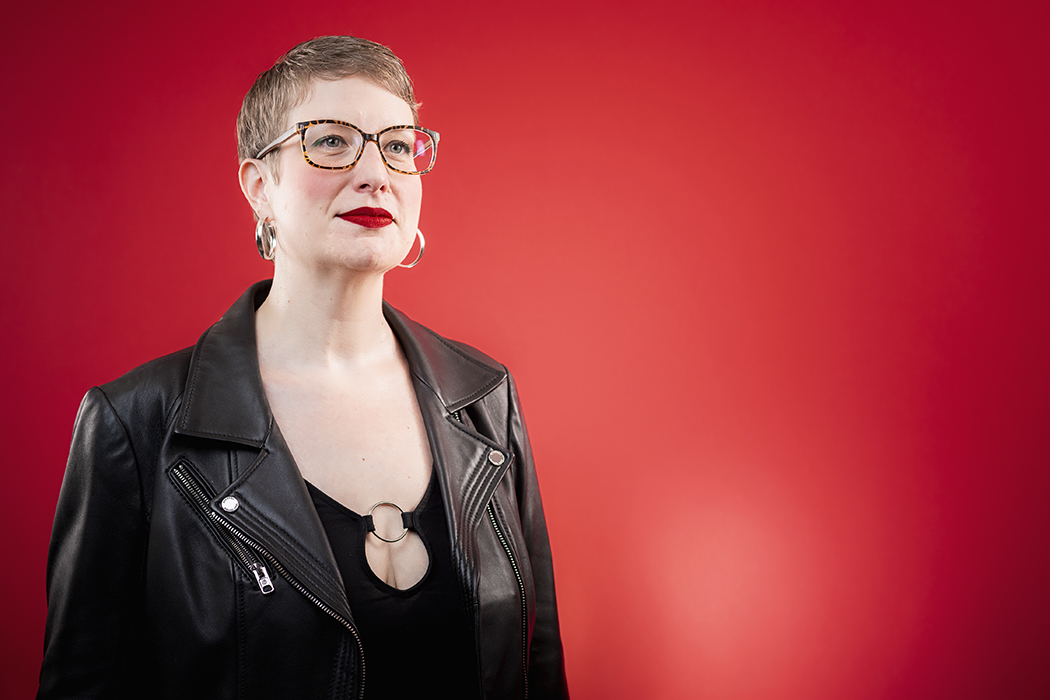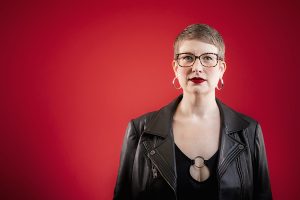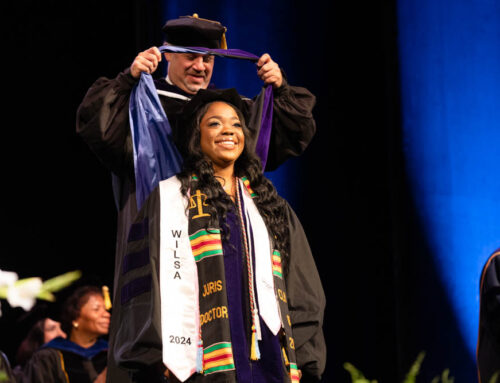
Photography by Danny Fulgencio.
Erica Stephens manages two orthodontist practices and teaches art appreciation in the Dallas County Community College District at night.
Besides that, she makes her own art, and she spends as much time and money as possible giving back to the community as a member of the Odd Fellows. She recently collected about 250 pairs of glasses for the Oak Cliff Lion’s Club just by asking friends on social media. And when she had to have a hysterectomy, friends donated thousands of tampons and pads for homeless women at her “bye-bye uterus” brunch. “I’m a big believer in the idea that you don’t have to do giant things to be effective.”
Erica Stephens

Her third place in the neighborhood, after home and work: Traditionally, it has been Tradewinds. But I’m into Revelers Hall now. I’m a huge jazz fan. I go to New Orleans four times a year just to listen to jazz. Revelers Hall is great. We are so lucky to have that in the neighborhood.
A career accomplishment she’s proud of: I’m proud of how many of my former students I’m still in touch with. We can maintain a relationship as they’ve gone on to careers and gotten married. I’m still young enough to have mentors who are alive, but I’m also old enough to have people to mentor. It’s a beautiful spot to be in. The idea of mentorship among women, there’s some legacy to that.
The most challenging thing she overcame at work: I once had a job where the leadership was terrible. It was all-male leadership, very anti-woman, and very anti-student. I was the only one pushing against it. I stayed on the entire year pushing back against that. At the end of the year, I was the first person they marched in and fired. They made a scene about it.
Misconceptions others have about her business: That college professors make a lot of money. We do not. We do it because we’re passionate about it. We do it for the same reason as most teachers. We do it because we love it.
What she looks for in employees: I look for soft skills more than hard skills. I can teach them how to use software. I cannot teach them to connect with another person. If they’re confident about who they are and are open to meeting other people, I will find a spot for them.
On her pride and joy: I rescue senior pugs, and they are the loves of my life. They’re old and weird and stinky. They remind me every day that it’s OK to be happy. You’ve got a limited amount of time here. Do what you can. I went through a tough breakup in my 30s, and I was at home one night just sobbing, a mess. And I looked over, and my pug was crying. And I was like, “OK, you can get over it because you’re not allowed to make your dog cry.”
The best advice she ever received: I had an important mentor in grad school, Marcia Tucker. She shaped who I am as an artist and a teacher. There was one time I hadn’t turned in my work for some reason. I can’t even remember why, and she was like, “You know what? That’s fine. We never know what’s going on in a person’s life.” Two months later, she died of lung cancer. I realized she wasn’t talking about me. She was talking about herself. And it changed me.
Her favorite gift: My parents gave me a grill that’s this giant monster gas and charcoal and grill and smoker all in one. I love to cook, and I’m the one who always grills in my family. I host community dinner parties, where I’ll send the invitation to 200 people, and I say invite your friends and friends-of-friends.
Her greatest influence: Marcia Tucker founded the New Museum in New York after being fired by the Whitney for putting on a show by Richard Tuttle. They told her it wasn’t art, and she did it anyway. She changed my life.
Advice to her younger self: Spend half as much energy investing in relationships with men and spend it on friendships with women. When I was in my 20s, I thought we women were competing. When I abandoned that idea, my relationships with men became better too.
Advice she would give to a teacher: Be passionate. Understand how to differentiate yourself. Instead of showing up and saying, “Pick me.” You should say, “Here is why I’m who you should pick.”
How she would like to be remembered: As a person who cared about other people and who was a good community member. That I lived up to my responsibility to care about other people.
Nonprofits she supports: I have done a lot to support the North Texas Food Bank. Jan Pruitt [who led the food bank for many years before her death in 2017] was a friend. I do food drives. I’ll take boxes to friends’ works. I’m like, “I’ll even come pick it up. You don’t have to do anything, and you can take all the credit.”
How she achieves work-life balance: I’m not very good at it. Every couple of months, I think, “You should probably slow down.” Every now and then I take a day off and sleep for 14 hours. I integrate everything in my life, and that just works for me. I’m a service- and community-oriented person.
How she relaxes: I love live jazz music. At least one night a week, you’ll see me out in Dallas. I know as many musicians as I do artists. I take vacations to New Orleans, and I just meet people and listen to music.
On our community’s biggest challenge: Gentrification. I’m a white woman who bought a house in a predominantly Latino neighborhood. There has to be a happy medium that grandfathers in people who live in the neighborhood. I should pay more in property taxes than someone who’s lived here for 30 years. Our financial realities are different. Technically I am a gentrifier, but I love my neighbors, and I’m upset that they’re being pushed out. I would like to see the city put in protections for what was already here. Growth and change can happen without bulldozing all the history.
How she would spend $1 million on our community: I would put it into women’s health and education, specifically addressing the needs of the community here because happy, healthy women lift up a happy, healthy community.






